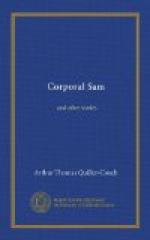‘Right, Bill!’ he called.
‘’Oo is it?’ asked the driver, slewing round in the light of his near-side lamp.
’Might be a commercial—if ’twasn’t for his bag, and his way of speakin’.’
The omnibus rattled off and down the hill. Colonel Baigent gazed after it, alone beneath the gas-lamp; for the few passengers who had alighted from his train had jostled past him and gone their ways, and his porter had turned back wearily into the station, where express and excursion trains had all day been running the Christmas traffic down to its last lees.
Colonel Baigent gazed after the omnibus, then back through the passage-way leading past the booking-office to the platform. All this was new to him. There had been no such thing as railway or railway station thirty-five years ago, when, a boy of seventeen just emancipated from school, he had climbed to the box-seat of the then famous ‘Highflyer’ coach, and been driven homewards to a Christmas in which the old sense of holiday mingled and confused itself with a new and wonderful feeling that school was over and done with for ever.
During his Indian exile he had nursed a long affection for the city; had collected and pored over books relating to it and its antiquities; and now, as he left the station and struck boldly into the footway on the right, he found himself surprisingly at home. The path led him over a footbridge, and along between high garden walls. But it led him surely enough to Westgate, and the spot occupied in Norman times (as he recalled) by five bordels or shanties, where any belated traveller (’such as I to-night,’ thought the colonel) arriving after the gates were shut, might find hospitality for the love of God. The suburb here lay deserted. He halted, and listened to a footfall that died away into the darkness on his right. He felt at home again—here, wrapped around by the ghostly centuries as by the folds of a mantle, and warm within the folds.
Strange to say, the chill came on him as he passed under the arch of Westgate, and into view of the busy High Street, the lit shops, the passers-by jostling upon the pavements, the running newsboys, the hawkers with their barrows, the soldiers strolling five abreast down the middle of the roadway. Here was the whole city coming and going. Here, precisely as he had left it thirty-five years ago, it sprang back into life again, like an illuminated clockwork. No; he was wrong, of course. It had been working all the while, and without intermission, absorbed in its own business—buying and selling, marrying and giving in marriage. He had dropped out, that was all.
The Christmas decorations, the jollity in the voices exchanging Christmas salutations, aggravated the poor colonel’s sense of homelessness, and seemed to mock it. One window displayed a huge boar’s head, grinning, with a lemon in its mouth. The proprietor of another had hung his seasonable wares on a small spruce fir, and lit it all over with coloured candles. A poulterer, three doors away, had draped his house-front, from the third story down, with what at first glance appeared to be a single heavy curtain of furs and feathers—string upon string of hares, of pheasants, of turkeys, fat geese, wild ducks.




